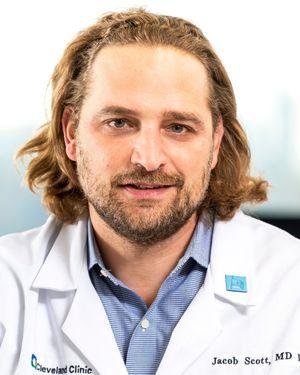Research News
11/26/2019
Understanding the Balance Between Ecological and Evolutionary Contributors to Cancer
Jacob Scott, MD, DPhil, Department of Translational Hematology and Oncology Research, recently received a five-year, $2.8M grant from the National Cancer Institute for his studies.

Jacob Scott, MD, DPhil, Department of Translational Hematology and Oncology Research, recently received a five-year, $2.8M grant from the National Cancer Institute, part of the National Institutes of Health, to study how ecological and evolutionary mechanisms contribute to lung cancer development and progression, and how the interplay between these mechanisms may provide novel treatment insights.
With this new grant, Dr. Scott will build on two major research efforts published earlier this year. The first of which, published in Nature Ecology and Evolution, detailed the first-in-class assay he and his team developed to directly quantify and describe the ecological forces (intracellular interactions) and evolutionary mechanisms (cell mutation and selection) that help give rise to the therapeutic resistance commonly observed in cancer cells. In this work, the researchers measured and compared growth rates of non-small cell lung cancer cells sensitive and resistant to the drug alectinib when cultured in different scenarios. The study offered important insights into when and under what conditions—termed “games”—resistant cells win out over sensitive cells.
The new funds will enable the Scott laboratory to continue this line of investigation—this time using the assay not just to measure games, but to manipulate them, as well.
The second line of Dr. Scott’s investigation will dig deeper into advances described in another paper from earlier this year. Published in Nature Communications, he and his team defined a quantitative measure of the probability of collateral sensitivity—a phenomenon observed when treatment with one drug induces susceptibility to a second— which laid the groundwork for finding genomic signatures of collateral sensitivity.
Leveraging this effort, Dr. Scott will search for patterns in drug sensitivity and resistance in an effort to better understand when the switch from sensitivity to resistance flips, and what molecular hallmarks may be predictive of that transition. Defining these molecular hallmarks will be a critical step in identifying clinically meaningful signatures that may help clinicians better track the progression of a patient’s cancer and anticipate necessary changes in treatment plans. Understanding the role that time plays in these transitions will be equally important.
Due to the heterogeneous nature of most tumors, Dr. Scott—who is also a practicing oncologist in the Department of Radiation Oncology, Taussig Cancer Institute—believes that a single silver bullet is not the answer to curing cancer. Instead, he suggests that researchers and oncologists may already have the drugs needed within reach. The question he is most interested in answering is not “which one is best?” but “in what combination and order is best?” Understanding these ecological and evolutionary dynamics, how to perturb them, and how to tell when the balance starts to tip towards resistance will be crucial in getting to the bottom of that question.
In addition to the $2.8M, this award also provides eligibility for an additional two years of funding, bringing the potential project total to seven years.
Photo credit: Russell Lee
Featured Experts
News Category
Related News
Research areas
Want To Support Ground-Breaking Research at Cleveland Clinic?
Discover how you can help Cleveland Clinic save lives and continue to lead the transformation of healthcare.
Give to Cleveland Clinic